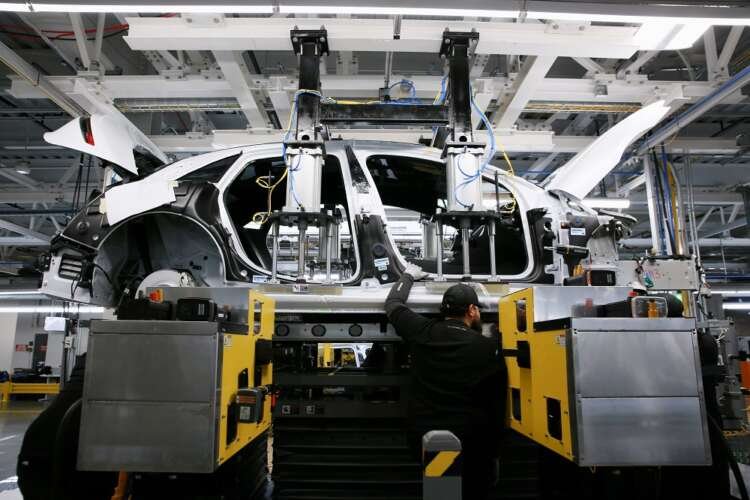Electric vehicle makers burning cash, slammed by sky-high costs
Published by Jessica Weisman-Pitts
Posted on November 14, 2022
4 min readLast updated: February 3, 2026

Published by Jessica Weisman-Pitts
Posted on November 14, 2022
4 min readLast updated: February 3, 2026

By Akash Sriram
(Reuters) – Every time Lucid Group Inc or Rivian Automotive Inc sells an electric car, they are losing hundreds of thousands of dollars due to staggering raw material and production costs, their latest earnings statements showed.
Quarterly reports from electric vehicle (EV) makers from the past two weeks show them struggling to hit delivery targets and rapidly burning through cash.
Lucid’s cost of revenue surged to $492.5 million in the July-September quarter from $3.3 million a year earlier, and its losses widened as customers canceled orders fearing long wait times.
The company, which went public a little over a year ago and is backed by Saudi Arabia’s Public Investment Fund, saw its market value shrivel by two-thirds this year to about $20 billion from $95 billion at its peak in November 2021.
The company said it had enough cash to sustain itself at least into the fourth quarter of next year and is looking to raise about $1.5 billion through a stock sale. Its stock price slumped 17% after results, and clawed back some losses in the next two sessions to finish on Friday down 4.4% from before it reported.
Graphic: EV stocks slump on production pushouts, deep losses, cash bur https://graphics.reuters.com/ELECTRICVEHICLES-STOCKS/gkplwgmdzvb/Pasted%20image%201668198479064.png
U.S.-listed British firm Arrival SA warned last week it may not have enough cash to keep its business going toward the end of next year, and would have to cut jobs. It has yet to start mass production.
“I’m not going to sit here and tell you it’s not a difficult time,” Avinash Rugoobur, president of Britain’s Arrival SA told Reuters on Friday.
“It’s tough, we are there every day, every night, working on technologies, the vehicles and also the capital raising.”
Canoo Inc said in May it had “substantial doubt” about remaining a going concern. At the end of September, it had $6.8 million in cash and equivalents, down sharply from $415 million a year earlier.
CASH IS KING
Many EV startups recorded huge losses in the September quarter and warned that high costs were here to stay due to surging inflation and a global supply chain crisis. Just a year earlier, several listed their stocks at heady valuations, lured by the success of Tesla, now the world’s most valuable automaker.
Tesla survived what its boss Elon Musk then called “production hell”, overcoming supply bottlenecks with battery deals with key suppliers, and ramping production for the smash hit Model 3.
The company, however, faced those challenges in a different time when it was nearly the only pure play EV maker and competition from legacy automakers including General Motors and Volkswagen was nascent.
In the latest quarter, Tesla reported earnings of $3.3 billion.
“In the EV business … being early stage is a money-burning exercise, it’s difficult to get over the hump,” said Canaccord Genuity analyst George Gianarikas.
Analysts said these companies must find ways to save money if they want to outlast a bad economy. Firms have taken different approaches.
Rivian is shifting more car deliveries across the United States to rail freight, while Lucid is considering it as an option.
Lordstown Motors, which issued a going-concern notice last year that led to the exits of its top bosses, has curtailed output.
The truck maker sold a fifth of itself to tech giant Foxconn this month. Last year, it sold its Ohio plant to the Taiwanese firm, a deal forced by the need for funds to start production of its Endurance pickups.
Still, higher output would ultimately reduce the cost per car and limiting production can threaten the path to profitability, analysts said.
Some among these companies are better positioned to survive.
Rivian, backed by Amazon.com and Ford Motor, had $13.8 billion cash on hand at the end of September. It also has a contract to supply 100,000 electric delivery vans to Amazon. But its cost of goods sold was about $220,000 per car versus an average selling price of $81,000 in the quarter, CFRA estimated.
Canaccord’s Gianarikas said there could be lessons here from the ’90s dotcom bubble: “It wasn’t always the company with the best business plan that made it. It was the company with the best balance sheet.”
(Reporting by Akash Sriram in Bengaluru; Writing by Aditya Soni; Editing by Sayantani Ghosh and David Gregorio)
Cash flow refers to the total amount of money being transferred into and out of a business, especially in relation to its operating activities.
Electric vehicles (EVs) are automobiles that are powered entirely or partially by electricity, using electric motors instead of internal combustion engines.
Market value is the total worth of a company, determined by the stock market based on the current share price multiplied by the total number of outstanding shares.
A stock sale involves selling shares of a company to raise capital, often used by companies to fund operations or expansion.
Explore more articles in the Technology category











